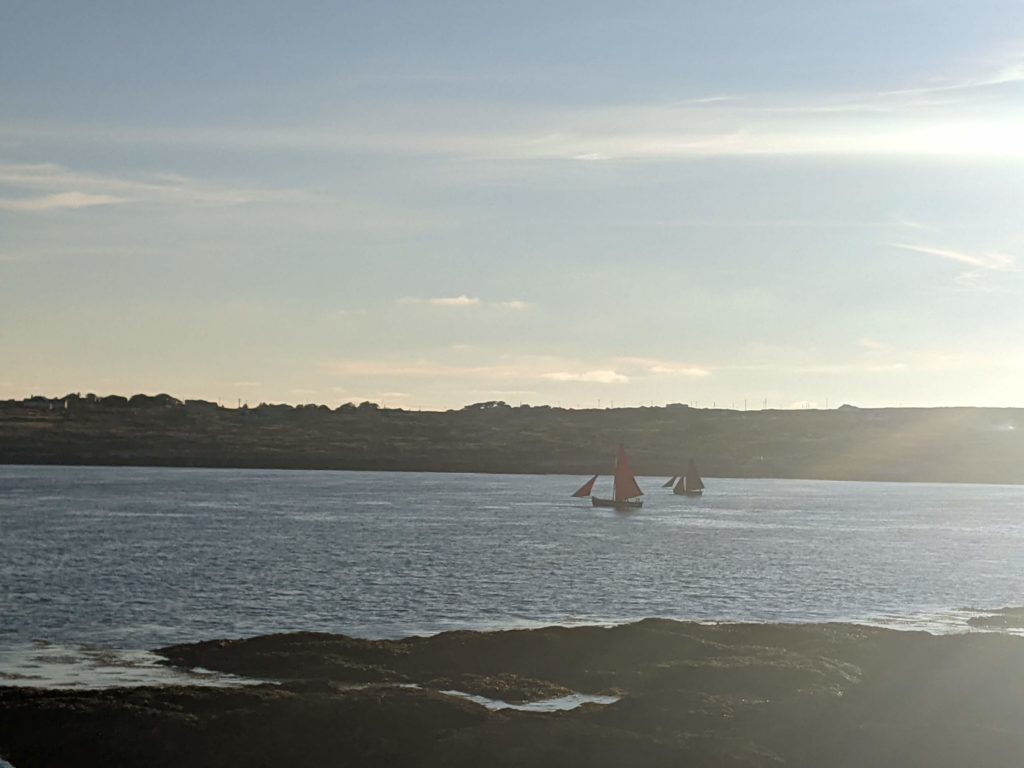Throughout my time learning in Ireland this summer, I experienced a few moments of worry wondering if I was really making any progress in learning Irish after I would forget a simple phrase that I used many times before or completely lose my train of thought and slip into an English finish when speaking. However, even after numerous realizations of my progress while away, I have had to think twice almost constantly before greeting and responding to family members upon my return home because my first instinct has been to do so in Irish nearly every time. At least a dozen times per day, I find myself saying “Maidin mhaith!” (“Good morning!”), “Go raibh maith agat” (“Thank you”), “Gabh mo leithscéal” (“Excuse/Pardon me”), and “Slán” (“Goodbye”). Prior to spending four weeks in Ireland this summer, I had never spent continuous time dedicated to learning a language other than English and had only classroom time learning Spanish in high school and Irish in college. Now that I am feeling more inclined to use Irish phrases, I am convinced that conversational comfort and fluency is best developed in an immersive situation in which there are opportunities to use the language with everyone around.
After spending a semester in Ireland during the last academic year, I felt that I had a very good understanding of Irish culture and its similarities and differences from the cultures which I grew up in. Though this was true in many areas of day-to-day life, there were certain values and issues much more clearly present in or exclusive to the Gaeltacht areas (Irish-speaking areas) that greatly revolved around the language and the preservation of culture. The Gaeltacht areas in which the vast majority of the population use Irish in daily conversation are quite small when compared to the rest of Ireland where people generally use English in conversational situations. When our course included field trips outside of the Gaeltacht areas, we very rarely heard spoken Irish and written Irish was also less prevalent, but still present since it is recognized as an official language in the country. Therefore, if those of us learning wished to order food in a restaurant in Irish or use the language in a shop or any other business, we could only do so within the Gaeltacht. I grew up in a very rural area myself and was impressed by the relatively robust business parks, various shops, and multiple restaurants in the Gaeltacht areas in both Donegal and Galway but compared to the options and opportunities available in the larger towns nearby, choices were limited. In addition to these situations, educational and employment opportunities in the larger cities within Ireland tend to attract young people more so than those in rural areas, a familiar phenomenon in the United States, too. For a long time, this has created a tension between the desire to pursue higher education or different employment opportunities, presently requiring the use of English to do so, and the desire to preserve the language and the unique culture within the Gaeltacht communities as fully as possible, at times necessitating sacrifices. Clearly, my experience this summer provided me with a great deal of insight beyond the language learning process itself and sparked a greater interest in the social dynamics surrounding Irish and the communities that choose to maintain its legacy.
Though my time in this immersion course was relatively short compared to some programs that other SLA recipients participated in, I can confidently say that I was learning something new every day and at nearly every moment. With time for constant observation and participation in class, on field trips, in homestays, and while interacting with locals in town, I gained a much greater understanding of the Irish language’s life within the Gaeltacht areas and its native speakers. During my time in Ireland, I sometimes found myself feeling overwhelmed and convinced that it would be impossible for me to process so much information, tempting me to block anything new out after a certain point in the day. However, though I am still digesting many experiences and will continue to do so for the next several weeks, I am thankful that I allowed myself to soak up more than I thought possible so that I can continue to learn and make more concrete connections by looking back at home. I also saw that extended language studies are extremely beneficial for all individuals, no matter the level of fluency. Although I had a solid classroom basis to grow from this summer, I observed beginner students with no class experience and intermediate students that were self-taught or had fewer classes develop in an unbelievable way. Now that I have returned, my task is persistence in the classroom and any time I get the chance to practice, which will further solidify this summer’s headway.
